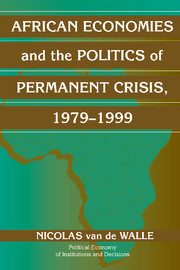Book contents
- Frontmatter
- Contents
- List of Tables
- Acknowledgments
- Introduction
- 1 Approaches to Africa's Permanent Crisis
- 2 Patterns in Reform Implementation, 1979–1999
- 3 Decision Making in Postcolonial Africa
- 4 State Responses to the Permanent Crisis
- 5 The Crisis and Foreign Aid
- 6 Democratization and the Prospects for Change
- 7 Conclusion
- Index
- Title in the Series
3 - Decision Making in Postcolonial Africa
Published online by Cambridge University Press: 05 June 2012
- Frontmatter
- Contents
- List of Tables
- Acknowledgments
- Introduction
- 1 Approaches to Africa's Permanent Crisis
- 2 Patterns in Reform Implementation, 1979–1999
- 3 Decision Making in Postcolonial Africa
- 4 State Responses to the Permanent Crisis
- 5 The Crisis and Foreign Aid
- 6 Democratization and the Prospects for Change
- 7 Conclusion
- Index
- Title in the Series
Summary
The Nigerian government passed decrees in 1972 and 1977 intended to limit and regulate foreign participation in the economy. The general commitment to what came to be called indigenization was established in the Second National Development Plan in 1970, and the policy was then implemented through the Nigerian Enterprises Promotion Decrees of 1972 and 1977. They established that certain parts of the Nigerian economy would exclude foreign-owned companies while other parts would tolerate them, as long as Nigerian equity participation was increased to at least 40 percent. Indigenization was motivated by the perception that ten years of independence had not lessened the economic dominance of both Western multinational corporations and of Middle Eastern (mostly Lebanese) family companies. Nigerian businessmen complained they were discriminated against and could not access bank credit to finance their expansion, while state officials, worried that foreign companies were not reinvesting their profits in the economy, wanted to exert greater control over the economy in order to accelerate Nigeria's industrialization.
The impact of the two indigenization decrees is hard to assess. They would affect well over a thousand companies, which were partly or wholly transferred either to private Nigerian business interests or to the public sector. Lebanese businesses were particularly hard hit, although the use of front men, various legal adjustments, and special exemptions helped many survive. Implementation of the decrees proved haphazard, prey to corruption and inefficiency, as “the state lacked the capacity to implement the program as its originators intended.”
- Type
- Chapter
- Information
- Publisher: Cambridge University PressPrint publication year: 2001



